2013.5 PEUGEOT 5008 display
[x] Cancel search: displayPage 160 of 404
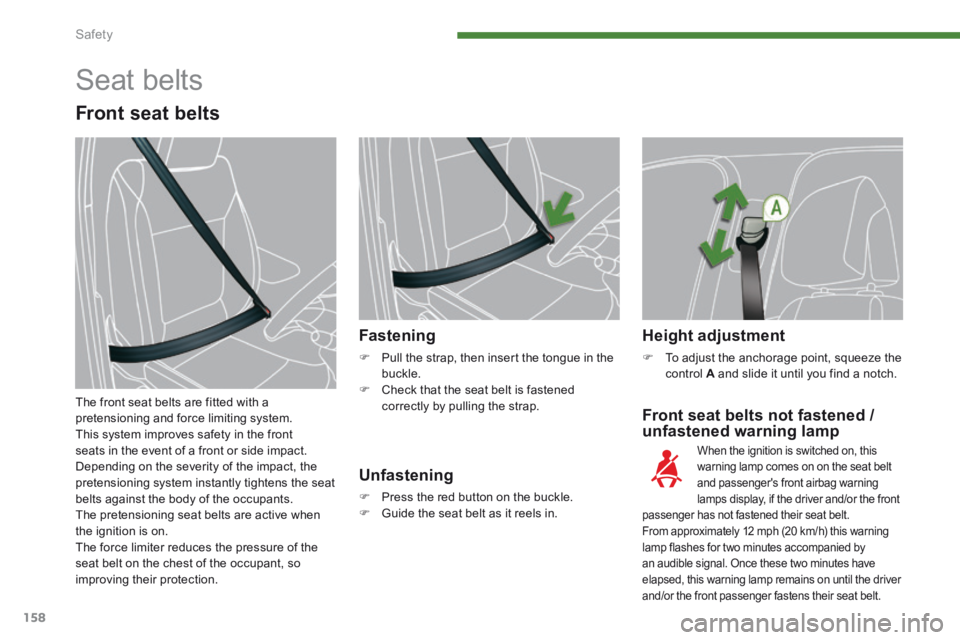
Safety
158
Front seat belts not fastened /
unfastened warning lamp
Fastening
Pull the strap, then insert the tongue in the buckle. Check that the seat belt is fastened correctly by pulling the strap.
Height adjustment
To adjust the anchorage point, squeeze the control A and slide it until you find a notch.
When the ignition is switched on, this warning lamp comes on on the seat belt and passenger's front airbag warning lamps display, if the driver and/or the front passenger has not fastened their seat belt. From approximately 12 mph (20 km/h) this warning
lamp flashes for two minutes accompanied by an audible signal. Once these two minutes have elapsed, this warning lamp remains on until the driver and/or the front passenger fastens their seat belt.
Unfastening
Press the red button on the buckle. Guide the seat belt as it reels in.
Seat belts
Front seat belts
The front seat belts are fitted with a pretensioning and force limiting system. This system improves safety in the front seats in the event of a front or side impact. Depending on the severity of the impact, the pretensioning system instantly tightens the seat belts against the body of the occupants. The pretensioning seat belts are active when the ignition is on.
The force limiter reduces the pressure of the seat belt on the chest of the occupant, so improving their protection.
Page 161 of 404
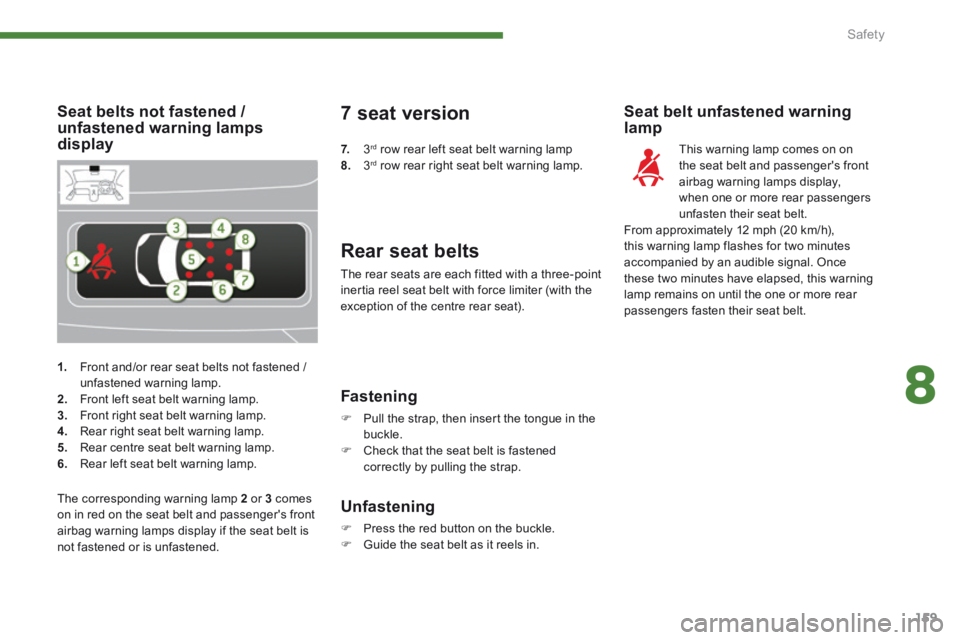
8
Safety159
1. Front and/or rear seat belts not fastened / unfastened warning lamp. 2. Front left seat belt warning lamp. 3. Front right seat belt warning lamp. 4. Rear right seat belt warning lamp. 5. Rear centre seat belt warning lamp. 6. Rear left seat belt warning lamp.
Seat belts not fastened / unfastened warning lamps display
Rear seat belts
The rear seats are each fitted with a three-point inertia reel seat belt with force limiter (with the exception of the centre rear seat).
Seat belt unfastened warning lamp
This warning lamp comes on on the seat belt and passenger's front airbag warning lamps display, when one or more rear passengers unfasten their seat belt. From approximately 12 mph (20 km/h), this warning lamp flashes for two minutes accompanied by an audible signal. Once these two minutes have elapsed, this warning lamp remains on until the one or more rear passengers fasten their seat belt.
Fastening
Pull the strap, then insert the tongue in the buckle. Check that the seat belt is fastened correctly by pulling the strap.
Unfastening
Press the red button on the buckle.
Guide the seat belt as it reels in.
The corresponding warning lamp 2 or 3 comes on in red on the seat belt and passenger's front airbag warning lamps display if the seat belt is
not fastened or is unfastened.
7 seat version
7. 3 rd row rear left seat belt warning lamp 8. 3rd row rear right seat belt warning lamp.
Page 162 of 404
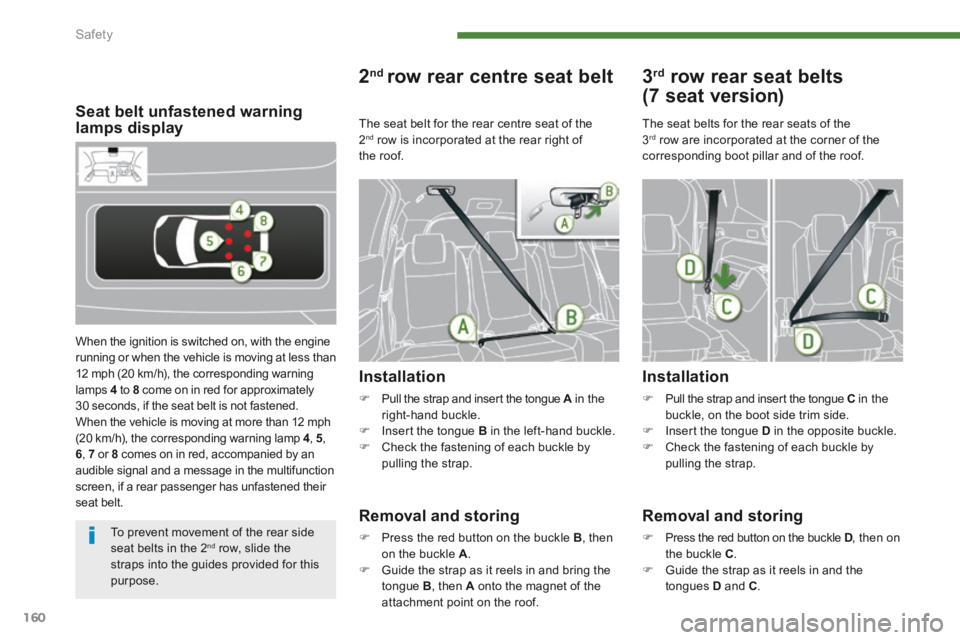
Safety
160
Seat belt unfastened warning lamps display
When the ignition is switched on, with the engine running or when the vehicle is moving at less than 12 mph (20 km/h), the corresponding warning lamps 4 to 8 come on in red for approximately 30 seconds, if the seat belt is not fastened. When the vehicle is moving at more than 12 mph (20 km/h), the corresponding warning lamp 4 , 5,6, 7 or 8 comes on in red, accompanied by an audible signal and a message in the multifunction screen, if a rear passenger has unfastened their seat belt.
2 ndrow rear centre seat belt
Installation
Pull the strap and insert the tongue A in the A in the Aright-hand buckle. Insert the tongue B in the left-hand buckle. Check the fastening of each buckle by pulling the strap.
Removal and storing
Press the red button on the buckle B , then on the buckle A . Guide the strap as it reels in and bring the
tongue B , then A onto the magnet of the attachment point on the roof.
3 rd row rear seat belts
(7 seat version)
Installation
Pull the strap and insert the tongue C in the buckle, on the boot side trim side. Insert the tongue D in the opposite buckle. Check the fastening of each buckle by pulling the strap.
The seat belts for the rear seats of the 3 rd row are incorporated at the corner of the corresponding boot pillar and of the roof.
Removal and storing
Press the red button on the buckle D , then on D , then on Dthe buckle C . Guide the strap as it reels in and the
tongues D and C .
The seat belt for the rear centre seat of the 2 nd row is incorporated at the rear right of the roof.
To prevent movement of the rear side seat belts in the 2 nd row, slide the straps into the guides provided for this purpose.
Page 165 of 404
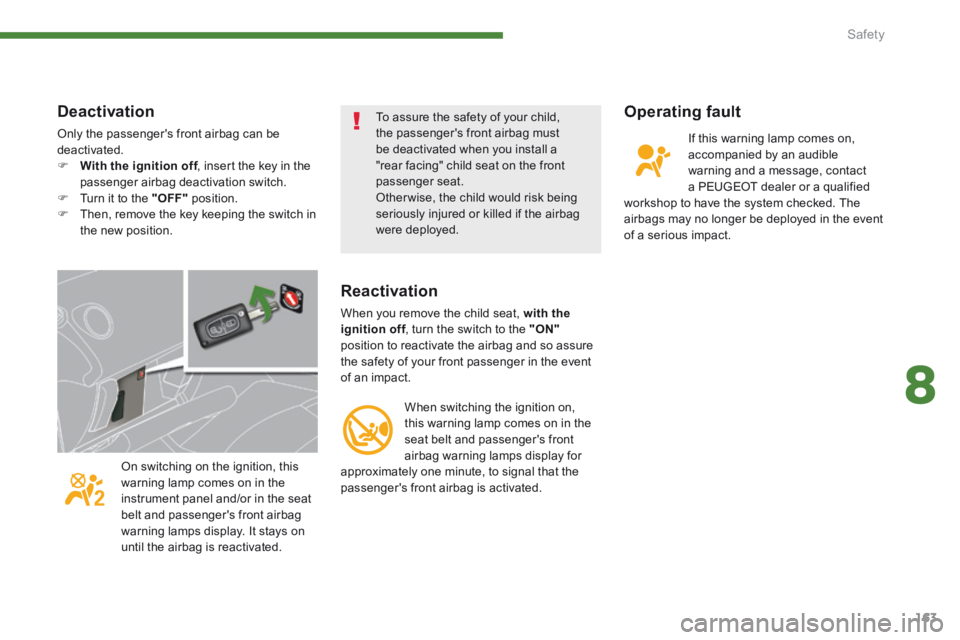
8
Safety163
Operating fault
If this warning lamp comes on, accompanied by an audible warning and a message, contact a PEUGEOT dealer or a qualified workshop to have the system checked. The airbags may no longer be deployed in the event of a serious impact.
Reactivation
When you remove the child seat, with the ignition off , turn the switch to the ignition off , turn the switch to the ignition off"ON"position to reactivate the airbag and so assure the safety of your front passenger in the event of an impact.
When switching the ignition on, this warning lamp comes on in the seat belt and passenger's front airbag warning lamps display for approximately one minute, to signal that the passenger's front airbag is activated.
On switching on the ignition, this warning lamp comes on in the instrument panel and/or in the seat belt and passenger's front airbag warning lamps display. It stays on until the airbag is reactivated.
Deactivation
Only the passenger's front airbag can be deactivated. With the ignition off , insert the key in the With the ignition off , insert the key in the With the ignition offpassenger airbag deactivation switch. Turn it to the "OFF" position. Then, remove the key keeping the switch in the new position.
To assure the safety of your child, the passenger's front airbag must be deactivated when you install a "rear facing" child seat on the front passenger seat. Otherwise, the child would risk being seriously injured or killed if the airbag were deployed.
Page 168 of 404
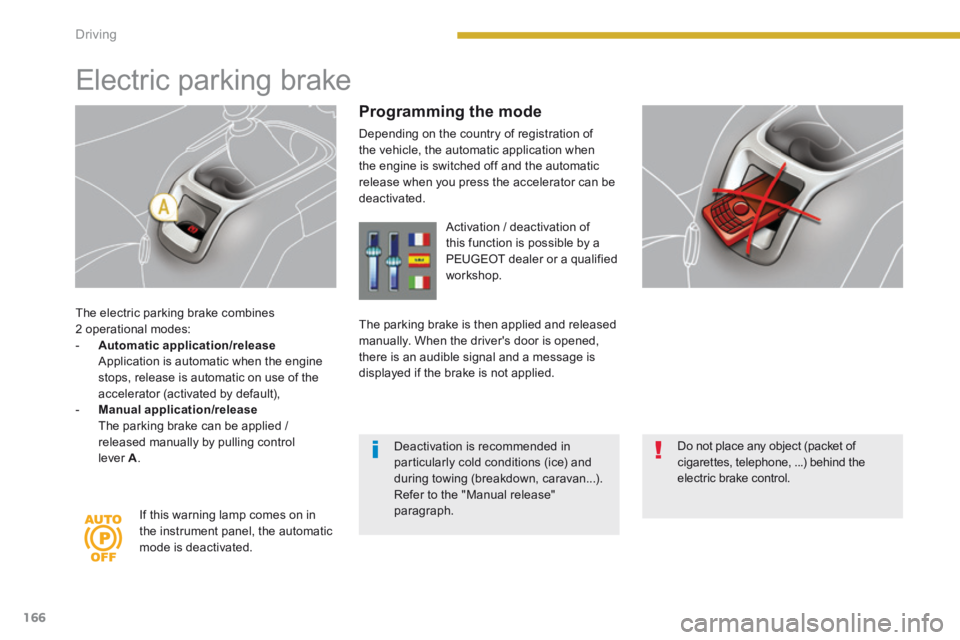
Driving
166
The electric parking brake combines 2 operational modes: - Automatic application/release Application is automatic when the engine stops, release is automatic on use of the accelerator (activated by default), - Manual application/release The parking brake can be applied / released manually by pulling control lever A .
Electric parking brake
Programming the mode
Depending on the country of registration of the vehicle, the automatic application when the engine is switched off and the automatic release when you press the accelerator can be deactivated.
If this warning lamp comes on in the instrument panel, the automatic mode is deactivated.
Activation / deactivation of this function is possible by a PEUGEOT dealer or a qualified workshop.
The parking brake is then applied and released manually. When the driver's door is opened, there is an audible signal and a message is displayed if the brake is not applied.
Do not place any object (packet of cigarettes, telephone, ...) behind the electric brake control.
Deactivation is recommended in particularly cold conditions (ice) and during towing (breakdown, caravan...). Refer to the "Manual release" paragraph.
Page 169 of 404
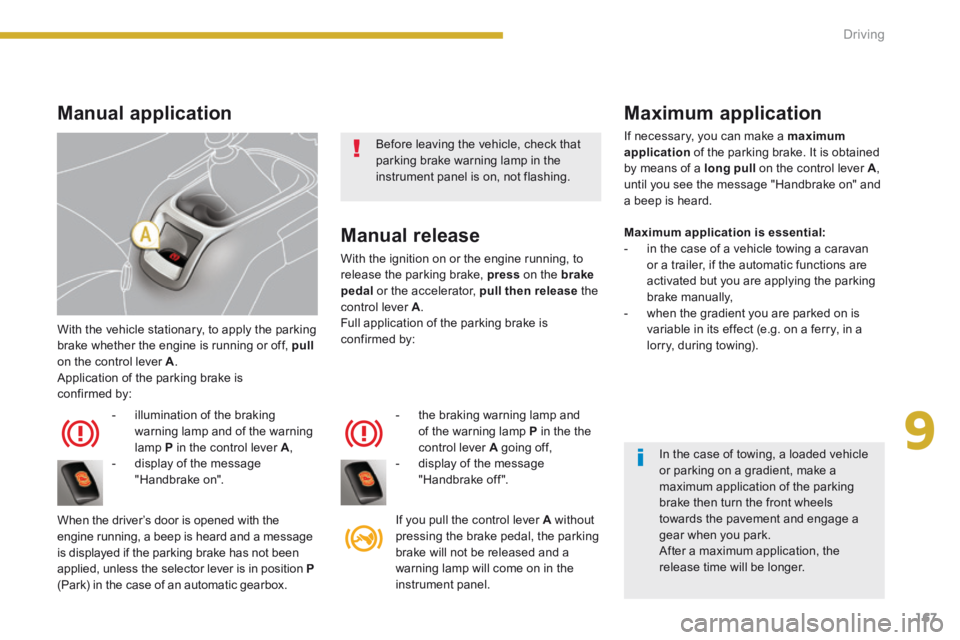
9
Driving167
With the vehicle stationary, to apply the parking brake whether the engine is running or off, pullon the control lever A . Application of the parking brake is confirmed by:
- illumination of the braking
warning lamp and of the warning lamp P in the control lever A , - display of the message "Handbrake on".
When the driver’s door is opened with the engine running, a beep is heard and a message is displayed if the parking brake has not been applied, unless the selector lever is in position P
(Park) in the case of an automatic gearbox.
Manual release
With the ignition on or the engine running, to release the parking brake, press on the brakepedal or the accelerator, pull then release the control lever A . Full application of the parking brake is confirmed by:
- the braking warning lamp and
of the warning lamp P in the the control lever A going off, - display of the message "Handbrake off ".
If you pull the control lever A without pressing the brake pedal, the parking brake will not be released and a warning lamp will come on in the
instrument panel.
Manual application Maximum application
If necessary, you can make a maximum application of the parking brake. It is obtained by means of a long pull on the control lever A , until you see the message "Handbrake on" and a beep is heard.
Maximum application is essential: - in the case of a vehicle towing a caravan or a trailer, if the automatic functions are activated but you are applying the parking brake manually, - when the gradient you are parked on is variable in its effect (e.g. on a ferry, in a lorry, during towing).
Before leaving the vehicle, check that parking brake warning lamp in the instrument panel is on, not flashing.
In the case of towing, a loaded vehicle or parking on a gradient, make a maximum application of the parking brake then turn the front wheels towards the pavement and engage a gear when you park. After a maximum application, the release time will be longer.
Page 170 of 404
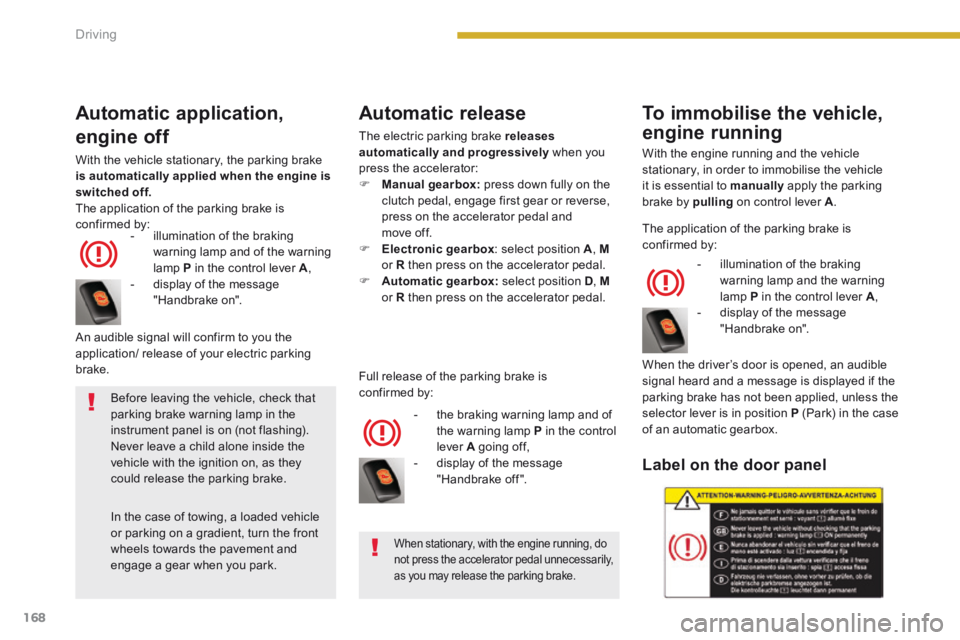
Driving
168
Automatic application,
engine off
With the vehicle stationary, the parking brake is automatically applied when the engine is switched off. The application of the parking brake is
confirmed by: - illumination of the braking confirmed by: - illumination of the braking confirmed by:
warning lamp and of the warning lamp P in the control lever A , - display of the message "Handbrake on".
Automatic release
The electric parking brake releases automatically and progressively when you press the accelerator: Manual gearbox: press down fully on the clutch pedal, engage first gear or reverse, press on the accelerator pedal and move off. Electronic gearbox : select position A , Mor R then press on the accelerator pedal. Automatic gearbox: select position D , Mor R then press on the accelerator pedal.
- the braking warning lamp and of the warning lamp P in the control lever A going off, - display of the message "Handbrake off ".
An audible signal will confirm to you the application/ release of your electric parking brake. Full release of the parking brake is confirmed by:
To immobilise the vehicle,
engine running
With the engine running and the vehicle stationary, in order to immobilise the vehicle it is essential to manually apply the parking brake by pulling on control lever A .
- illumination of the braking warning lamp and the warning lamp P in the control lever A , - display of the message "Handbrake on".
When the driver’s door is opened, an audible signal heard and a message is displayed if the parking brake has not been applied, unless the selector lever is in position P (Park) in the case of an automatic gearbox.
Label on the door panel
When stationary, with the engine running, do not press the accelerator pedal unnecessarily, as you may release the parking brake.
Before leaving the vehicle, check that parking brake warning lamp in the
instrument panel is on (not flashing). Never leave a child alone inside the vehicle with the ignition on, as they could release the parking brake.
In the case of towing, a loaded vehicle or parking on a gradient, turn the front wheels towards the pavement and engage a gear when you park.
The application of the parking brake is confirmed by:
Page 171 of 404

9
Driving169
Emergency braking
In the event of a failure of the main service brake or in an exceptional situation (e.g. driver taken ill, under instruction, etc) a continuous pull on the control lever on the control lever on the control leverA will stop the vehicle . The dynamic stability control (DSC) provides stability during emergency braking. If there is a fault with the emergency braking,
one of the following messages will be displayed: - "Parking brake faulty". - "Parking brake control faulty".
If a failure of the DSC system is signalled by the illumination of this warning lamp, then braking stability is not guaranteed. In this event, stability must be assured by the driver by repeating alternate "pull release" actions on control lever A .
Before leaving the vehicle, check that parking brake warning lamp in the instrument panel is on, not flashing.
The emergency braking must only be used in exceptional circumstances.
Particular situations
In certain situations (e.g. starting the engine), the parking brake can automatically alter its force. This is normal operation. To advance your vehicle a few centimetres without starting the engine, but with the ignition on, press on the brake pedal and release the parking brake by pulling then releasing control lever A . The full release of the parking brake is confirmed by the warning lamp in the control lever A and the warning
lamp in the instrument panel going off and the display of the message "Handbrake off ". If a parking brake fault occurs while applied or if the battery runs flat, an emergency release is always possible.